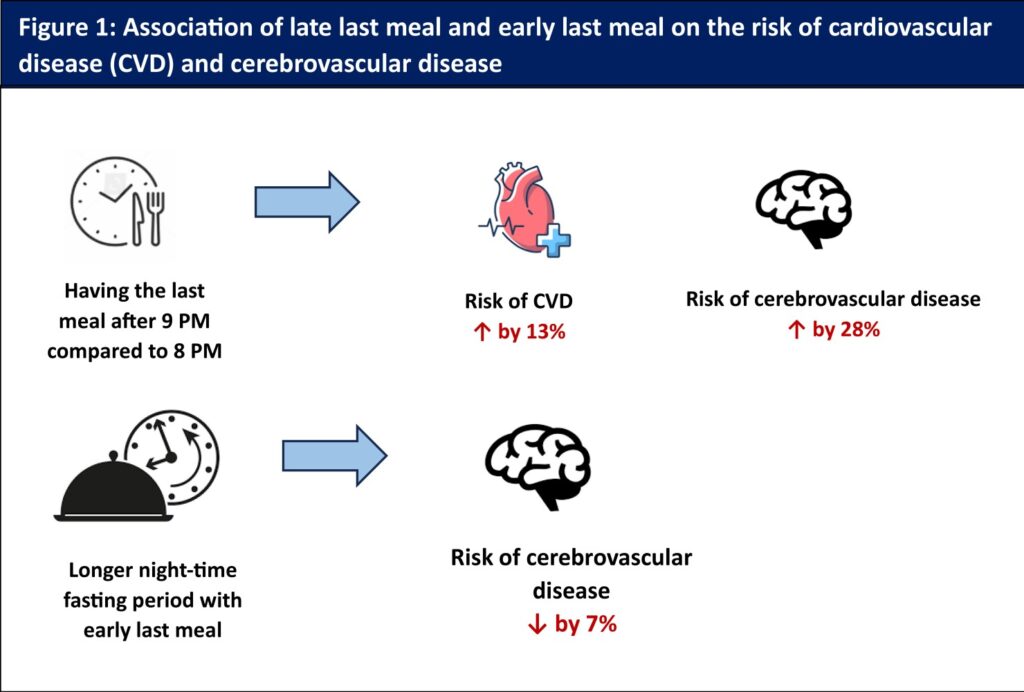
Poor dietary behaviors and patterns, a major risk factor of cardiovascular diseases (CVD), are associated with 7.94 million CVD-related deaths annually. The fast-paced modern lifestyle is linked with untimely food habits, like skipping breakfast and eating late at night. The daily eating/fasting cycle, integral to circadian rhythms, significantly influences cardiometabolic functions and impacts blood pressure regulation. Data from observational and interventional studies highlight the pivotal role of breakfast in maintaining cardiometabolic health, as well as the risks associated with its omission (obesity and heightened susceptibility to CVD and diabetes). Prospective studies have documented the impact of late-night eating on cardiovascular risk, emphasizing the need for understanding the earlier daily eating patterns and fasting cycles for better cardiovascular health.
A study by Palomar-Cros et al., published in the journal, “Nature Communications”, demonstrated the potential advantage of earlier eating patterns, along with having an early final meal and extending the night-time fasting duration, rather than omitting breakfast, in preventing CVD.
This ongoing web-based cohort (NutriNet-Santé) study involved 1,03,389 participants aged 18 or older without any prevalent CVD. Dietary assessment was carried out through bi-annual series of 3 random records of 24-h food intake. The participants filled a set of questionnaires on socio-demographics, lifestyle, physical activity, anthropometrics, health status, and diet. Analysis on the night-time fasting duration, the time of first and last meal of the day, and the number of eating occasions was computed based on the first two years of follow-up. The information regarding any major health events was made through a health questionnaire sent every 6 months, or through NutriNet-Santé website. The study outcome included assessment of the association between nutritional behaviors and the risk of developing CVD, ascertained through self-reports, medical records, health questionnaires, national health databases, and mortality registries. A multivariable Cox proportional-hazards models was used to examine the association of dietary behavior with the risk of CVD, coronary heart disease, and cerebrovascular disease.
The study results are summarized below:
- The study participants completed an average of 5.7 dietary records, with a maximum of 15 records.
- The participants with higher variability in meal timings included young participants, students or unemployed, single individuals, and current smokers. They reported higher alcohol consumption, more binge drinking episodes, and later bedtimes compared to those with early meal timings.
- Association of late last meal and early last meal on the risk of CVD and cerebrovascular disease are highlighted in Figure 1.
- Risk of overall CVD
- Each additional hour in delaying the time of the first meal of the day was associated with a 6% higher risk of overall CVD (hazard ratio [HR] 1.06, 95% confidence interval [CI] 1.01–1.12; p = 0.02).
- Having the last meal after 9 PM was linked with a 13% higher risk of overall CVD compared to the last meal before 8 PM (HR 1.13, 95% CI 0.99–1.29; p-trend = 0.06).
- Risk of cerebrovascular disease
- Each additional hour in delaying the time of the last meal was associated with an 8% increased risk of cerebrovascular disease (HR 1.08, 95% CI 1.01–1.15; p = 0.02).
- Having the last meal after 9 PM was linked with a 28% higher risk of cerebrovascular disease compared to the last meal before 8 PM (HR 1.28, 95% CI 1.05–1.55; p-trend <0.01).
- Each additional hour of night-time fasting was associated with a 7% lower risk of cerebrovascular disease (HR 0.93, 95% CI 0.87–0.99; p = 0.02).
- Stronger associations were observed in women than in men for overall CVD risk (Table 1).

Clinical implications
- The study emphasizes the need of encouraging proper meal timing, especially an early first and last meal of the day, which have potential protective associations for cardiovascular health.
- ·The study findings suggest potential clinical benefits of a longer night-time fasting duration when paired with early first and last meals, as opposed to skipping the breakfast.
(Source: Palomar-Cros A, Andreeva VA, Fezeu LK, Julia C, et al. Dietary circadian rhythms, and cardiovascular disease risk in the prospective NutriNet-Santé cohort. Nat Commun. 2023;14(1):7899. Doi: 10.1038/s41467-023-43444-3)
